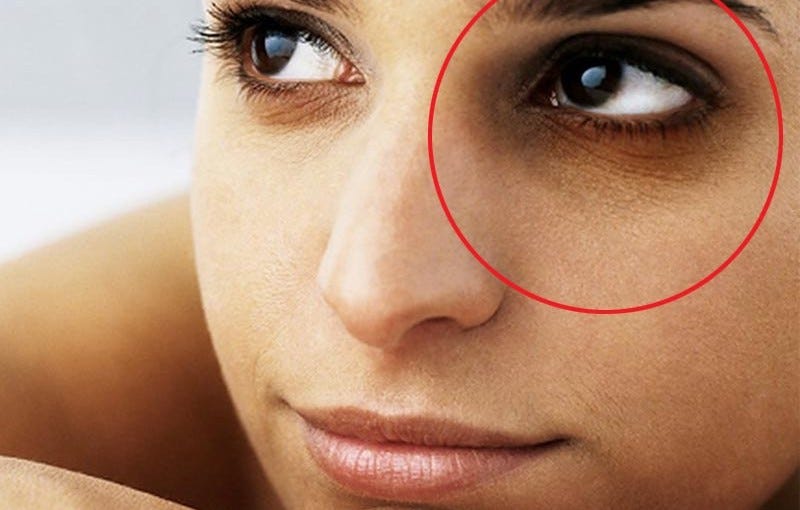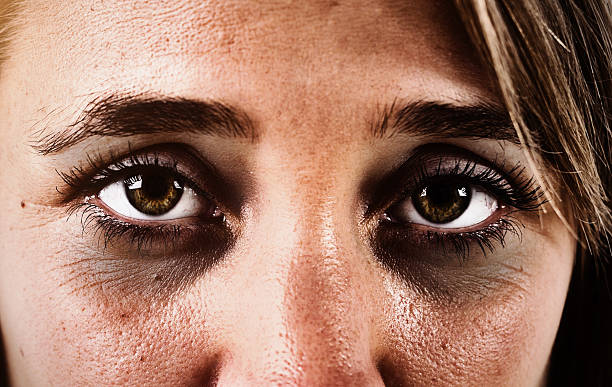Dark circles: Dark circles under the eyes refer to the darkened skin area below your eyes. The color of dark circles may vary, appearing as shades of blue, purple, brown, or black, depending on your skin tone.

Causes of Dark Circles:
-
- Genetics: Hereditary factors can make dark circles more prominent.
- Lack of Sleep: Sleep deprivation can lead to pale skin, making blood vessels more visible.
- Aging: Thinner skin and loss of fat and collagen can make dark blood vessels more noticeable.
- Allergies: Allergic reactions can cause irritation and swelling, leading to dark circles.
- Dehydration: Insufficient hydration can make the eyes look sunken and create shadows.
- Eye Strain: Overusing digital screens can strain eyes and contribute to dark circles.
- Sun Exposure: Overexposure can increase melanin production, darkening the under-eye area.
- Iron Deficiency: Lack of iron can reduce oxygen flow to tissues, making dark circles more pronounced.
- Lifestyle Factors: Smoking, alcohol consumption, and poor diet can exacerbate dark circles.
Treatment for Dark Circles
- Topical Treatments:
- Vitamin C: Brightens skin and reduces pigmentation.
- Retinol: Boosts collagen production, thickening the skin.
- Hydroquinone: Lightens hyperpigmentation (use under dermatologist guidance).
- Home Remedies:
- Cold Compress: Reduces swelling and lightens the area.
- Cucumber or Potato Slices: Soothing effect and natural bleaching properties.
- Tea Bags: Contains caffeine and antioxidants to reduce puffiness.
- Medical Procedures:
- Chemical Peels: Lightens dark pigmentation.
- Laser Therapy: Targets pigmentation and stimulates collagen production.
- Fillers: Adds volume to hollow areas under the eyes.
- Lifestyle Adjustments:
- Ensure 7-8 hours of quality sleep.
- Stay hydrated throughout the day.
- Use sunscreen daily to prevent sun damage.
- Manage Allergies: Treat allergies with antihistamines or decongestants to reduce inflammation and blood vessel dilation under the eyes.
Prevention of Dark Circles
Healthy habits and proactive care of the delicate skin around your eyes are essential to prevent dark circles. Here are key strategies:
- Healthy Sleep Habits: Maintain a consistent sleep schedule. Aim for 7-9 hours of quality sleep each night to reduce fatigue and avoid pale skin that can accentuate dark circles. Use a supportive pillow to slightly elevate your head, reducing fluid retention around the eyes.
- Hydration: Drink at least 8-10 glasses of water daily to prevent dehydration, which can make the eyes appear sunken.
- Sun Protection: Use sunscreen with SPF 30+ and wear sunglasses.
- Balanced Diet: Incorporate foods rich in iron, vitamin C, and antioxidants.
- Consume foods rich in:
- Iron: Spinach, and lentils to prevent anemia.
- Vitamin K: Broccoli and kale to support healthy blood vessels.
- Antioxidants: Berries and citrus fruits to reduce oxidative stress.
- Limit Eye Strain: Follow the 20-20-20 rule when using screens.
- Avoid Rubbing Eyes: Reduces irritation and prevents worsening dark circles.
- Use an Eye Cream: Moisturize with products containing hyaluronic acid or peptides.
Dark circles under the eyes are usually not a sign of a serious health issue, but many people find them cosmetically undesirable. Consulting a doctor is recommended if over-the-counter treatments fail to provide satisfactory results. A doctor may prescribe prescription-strength skin-lightening creams or discuss more permanent solutions, such as surgical procedures, to address dark circles.


